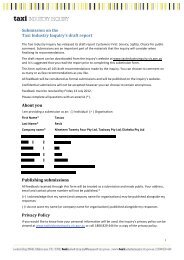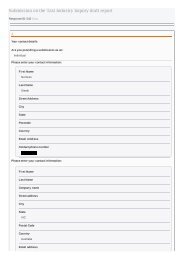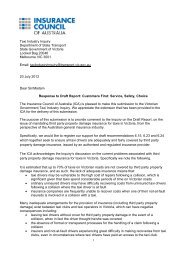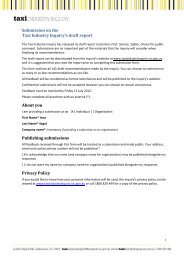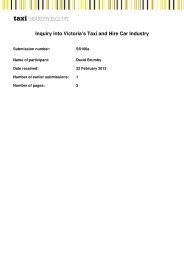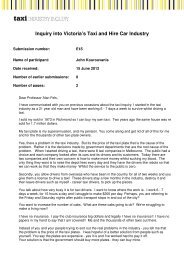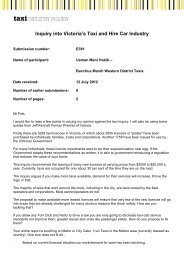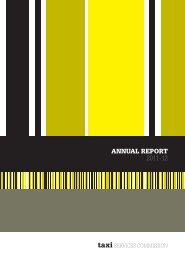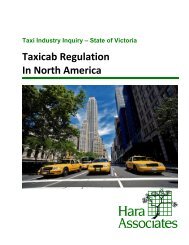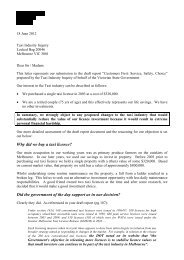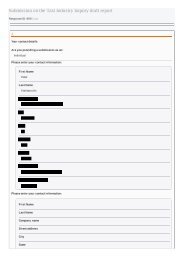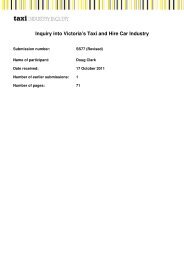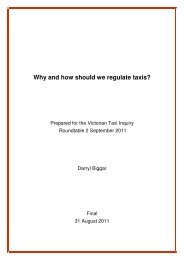Part D â Understanding and improving industry performance (PDF ...
Part D â Understanding and improving industry performance (PDF ...
Part D â Understanding and improving industry performance (PDF ...
You also want an ePaper? Increase the reach of your titles
YUMPU automatically turns print PDFs into web optimized ePapers that Google loves.
In recent years, NSPs have increased their participation<br />
in the <strong>industry</strong> by providing ancillary services to operators<br />
<strong>and</strong> drivers including finance, electronic payment<br />
processing, taxi licence broking <strong>and</strong> driver training. In<br />
Melbourne, progressive mergers <strong>and</strong> acquisitions of<br />
small to medium sized NSPs have led to increasing<br />
concentration of ownership of NSPs. Today, while there<br />
are six accredited NSPs for the Melbourne metropolitan<br />
area, an effective duopoly exists with three NSPs being<br />
subsidiaries of Cabcharge (Black Cabs, Arrow Taxis <strong>and</strong><br />
North Suburban Taxis) <strong>and</strong> Silver Top Taxis <strong>and</strong> West<br />
Suburban Taxis sharing common ownership.<br />
The necessity for m<strong>and</strong>atory NSP affiliation is becoming<br />
less clear, particularly as customers are increasingly<br />
embracing alternative means of booking taxi services due<br />
to the emergence of informal (‘secondary’) networks <strong>and</strong><br />
the growing use of smartphone applications. In addition,<br />
evolving technologies offer new <strong>and</strong> possibly cheaper<br />
alternatives for fleet tracking to ensure the safety of<br />
passengers <strong>and</strong> drivers. The inquiry has also found that<br />
booking services represent a smaller share of total trips<br />
than had commonly been assumed.<br />
As noted throughout this report, the inquiry considers<br />
that the structure of the <strong>industry</strong> is a critical area that<br />
must be addressed in order to deliver sustainable taxi<br />
reform. In particular, measures to promote a move to a<br />
more competitive environment for booking services <strong>and</strong> to<br />
simplify <strong>and</strong> clarify the responsibilities <strong>and</strong> roles of <strong>industry</strong><br />
participants in the delivery of taxi services for passengers<br />
are likely to deliver significant consumer benefits.<br />
11.1.1. Consumer research<br />
The inquiry’s commissioned consumer research<br />
conducted by Ipsos Social Research Institute found that<br />
ease of booking services is a key attribute in relation to<br />
satisfaction with taxi services. Taxi users reported, “that<br />
there are considerable limitations with regards to existing<br />
phone booking services”, with the main drawbacks being<br />
the wait times involved in speaking with an operator <strong>and</strong><br />
in the taxi arriving after placing the booking. 1<br />
Many participants found it very frustrating that the operator<br />
does not give an estimated time of arrival for the taxi, but<br />
instead always states that it will be ‘the next available’ cab.<br />
Several users said that they frequently called the phone<br />
booking service back when the taxi had not arrived after a<br />
length of time <strong>and</strong> are again informed it will be ‘the next<br />
available’, adding further to their frustration. While most<br />
taxi users acknowledged that waits are sometimes<br />
inevitable, there was almost universal agreement that<br />
operators should inform customers if there will be a<br />
prolonged wait during busy times, with one regular taxi<br />
user commenting: “What we need is greater transparency<br />
of wait times”. 2<br />
Another issue encountered by many participants in<br />
relation to booking taxis was the taxi failing to arrive at all.<br />
For some less regular taxi users, such experiences have<br />
led to them to question the convenience of booking taxis<br />
<strong>and</strong> to preferring other forms of transport they consider<br />
to be more reliable. For more regular taxi users, it has<br />
led them to preferring to hail a taxi or use a rank (unless<br />
travelling from home) as “these strategies, when they<br />
work well, are seen to involve less waiting <strong>and</strong> uncertainty<br />
than phone booking”. 3<br />
These concerns are reflected in the quarterly taxi<br />
customer satisfaction research conducted by the<br />
Department of Transport (DOT). Satisfaction was<br />
reasonable in relation to aspects of the taxi booking<br />
service, including ease of using the service (77.4 on a<br />
100 point scale), staff helpfulness <strong>and</strong> knowledge (77.1)<br />
<strong>and</strong> the range of options for booking (73.4). However,<br />
lower levels of satisfaction were recorded for wait time on<br />
Fridays <strong>and</strong> weekends (55.9), availability of information if<br />
there are problems with a booking (51.3) <strong>and</strong> wait time<br />
during a major event (45.4). 4<br />
Submissions <strong>and</strong> consultations<br />
Taxi users <strong>and</strong> drivers have expressed concerns about<br />
the <strong>performance</strong> of primary NSPs <strong>and</strong> the effects of the<br />
market dominance of the largest NSPs.<br />
Performance of booking services<br />
The inquiry has heard repeatedly from taxi users that they<br />
are dissatisfied with the phone booking <strong>and</strong> dispatch<br />
services provided by the primary metropolitan NSPs.<br />
Their concerns relate to:<br />
• Unreliable services – with long wait times or taxis not<br />
turning up at all<br />
• A lack of accountability for services – with NSPs<br />
perceived as unwilling to advise customers where<br />
their booked taxi is or how long it may take to arrive<br />
<strong>and</strong> disinterested in pursuing bookings that are not<br />
honoured<br />
• Difficulties in contacting booking services via<br />
telephone during particularly busy periods – with<br />
customers waiting long periods of time to speak to<br />
an operator or having their calls go unanswered.<br />
1 Ipsos Social Research Institute (2012), Op. Cit., p.31<br />
2 Ibid., p.32<br />
3 Ibid., p.32<br />
4 Wallis Consulting Group P/L (July 2011), Customer Satisfaction<br />
Monitor Survey Metropolitan Taxis Report, April-June 2011,<br />
Department of Transport, Melbourne, Victoria, p.14<br />
<strong>Underst<strong>and</strong>ing</strong> <strong>industry</strong> <strong>performance</strong> CUSTOMERS FIRST 223



